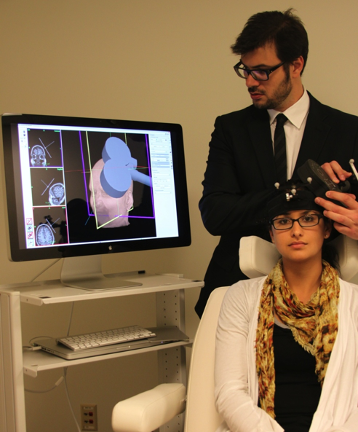Managing Stress During Cancer Treatment
April Hirschberg, MD and Rachel Millstein, PhD share practical ways to ease stress and improve your well-being.
Contact Information
Tracy Barbour, MD
Medical Director, TMS clinical service
Division of Neuropsychiatry
Massachusetts General Hospital
149 13th St.
Boston, MA 02129
Joan Camprodon, MD, MPH, PhD
Chief, Division of Neuropsychiatry
Director, Laboratory for Neuropsychiatry and Neuromodulation
Massachusetts General Hospital
149 13th St.
Boston, MA 02129

Interventional neuropsychiatry and neuromodulation is a rapidly evolving clinical subspecialty that uses device-based neuromodulation to treat patients with brain disorders. Despite its growing relevance, there is no established path for clinicians to train in this technical and highly specialized space. This fellowship provides a one-year post-residency training curriculum to address this important gap.
Neuromodulation techniques are generally divided into three categories:
Given the strong history and current clinical and research presence of all three neuromodulation categories at the Massachusetts General Hospital, the Interventional Neuropsychiatry and Neuromodulation Fellowship aims to uniquely provide comprehensive clinical training (theoretical and procedural) in the full spectrum of techniques. In addition, fellows will develop expertise in novel emerging modalities such as transcranial Photobiomodulation (tPBM) and low intensity focused ultrasound (LIFUP), as well as relevant non-device modalities such as Ketamine infusions.
Despite the many modality-specific knowledge areas, we believe there is a shared neurobiological and clinical framework across all neuromodulation therapies. Neurotherapeutic devices intervene at the level of circuits, and therefore, it is important for interventional neuropsychiatrists to be very familiar with circuit pathophysiological models, and more practically, comfortable generating circuit-based clinical formulations of individual patients (not just the conditions they have). Hence, a critical goal of the fellowship is to teach trainees a clinical circuit-based approach to anamnesis, exam, differential diagnosis, clinical formulation and, of course, treatment planning.
While this is a clinical fellowship, it takes place in an environment where the research and clinical missions are uniquely integrated so that the traditional boundaries between science and patient care are very fluid: the lab is in the clinic and the clinic in the lab. Fellows will be able to train and practice in this translational environment, learn from clinician-scientist mentors and develop their unique identity and niche of expertise with protected research time.
We are aiming to train the next generation of interventional neuropsychiatrists who will shape the growth of the field and impact the development and application of individualized device therapeutics.
Given the relative early stage of development of the field of interventional neuropsychiatry, it is critical that master clinicians not only become excellent practitioners able to critically adopt fast evolving technical and clinical innovations, but that they are part of the process of catalyzing such innovations through their own impactful research. Towards this end, fellows will have protected research time and ample opportunities to develop clinical, translational and/or basic research projects in neuromodulation and circuit neuroscience throughout Mass General and Harvard research environments.
Every fellow will be paired with a research mentor and will be expected to complete a research project leading to a publishable manuscript during the course of the fellowship. There will be opportunities to present original work at scientific or clinical meetings. Fellows will have access to educational resources from Mass General and Harvard University, including libraries and online resources, in addition to professional meetings and trainings. While a strong research background is not required to apply to our program, trainees motivated to become clinician-scientists (independent of their previous research experience) will find our program particularly appealing.
Fellows will participate in year-long longitudinal rotations within the Interventional Neuropsychiatry and Neuromodulation Fellowship core clinics, as well as have dedicated research time to complete a clinical or scholastic research project.
As part of your educational experience, you will attend hour-long, weekly formal didactics on topics related to the core clinical experiences as well as circuit-based neuroscience.
Sample Lecture Topics
To apply to the Interventional Neuropsychiatry and Neuromodulation Fellowship, send your personal statement, CV and 3 letters of recommendation to Tracy Barbour (tbarbour@partners.org) and Joan Camprodon (jcamprodon@mgh.harvard.edu).
Applications will be accepted on a rolling basis. Interviews will occur between July and January for the following academic year. Offers will be given to candidates by February for the following academic year.
Joan Camprodon-Gimenez, MD, PhD, MPH
Michael Kritzer-Cheren, MD, PhD
U.S. News & World Report rates Mass General Psychiatry the top in the nation.
Find information on psychiatry residencies, fellowships and other continuing medical education opportunities.
Advances in Motion highlights the latest breakthroughs, research and clinical trials from Mass General.
Learn from residents, fellows and program leaders about the exceptional learning experiences offered at Mass General.
April Hirschberg, MD and Rachel Millstein, PhD share practical ways to ease stress and improve your well-being.
Dr. James McKowen joins Drs. Olivio and Seilder on their podcast “College is Fine, Everything’s fine” to discuss alcohol and substance use on campus.
Research has shown that integrating anything at this scale into human daily life could lead to overuse and addiction. So what does all this screentime mean for our long-term mental and physical health?
Could early-life childhood adversity such as trauma, socio-economic hardship, or parental illness have an impact mental health and resilience later in life?
In this large-scale comparative effectiveness trial, researchers demonstrated the equivalence of delivering early palliative care via video versus in-person visits on quality of life in patients with advanced lung cancer.
The Mass General Addiction Recovery Management Service (ARMS) addresses gaming, gambling and problematic digital technology use in young adults.
As a world leader in medical discovery and patient care, Mass General Neuroscience brings together the expansive expertise and passion from our Psychiatry, Neurosurgery and Neurology Departments. Through Advances in Motion, we provide health care professionals with information about our latest breakthroughs, research and clinical advances.